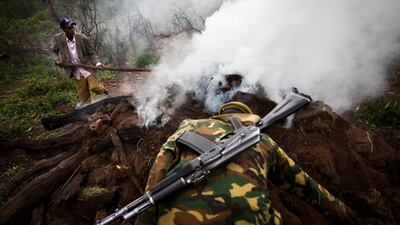Hammering down on the financial rewards of the illegal wildlife trade is the new frontier in the battle against traffickers the UK government has said as it launched a new taskforce to stop criminal networks benefiting.
With official backing including the US Department of Justice, around 30 global banks and financial institutions, including JP Morgan and HSBC have agreed to form a task force to target funds flowing from the trade. The taskforce is aimed at choking the ability of poachers and traders to move money. Often the same gangs trafficking wildlife products are likely to move other illegal goods, like drugs and weapons, according to officials.
“Wildlife trafficking is fundamentally about the proceeds and profits. This can take many forms, but whatever median it goes through the hidden drive remains the same. Very little is being done to address this financial motivation,” said Cathy Haenlein, senior research fellow at the Royal United Services Institute.
In parallel British development aid will underwrite a project will launch investigations, seize assets and train law enforcement in east and southern African countries. As
“We can only stop the illegal wildlife trade by targeting the international gangs and criminal networks which essentially drive it,” said UK development secretary Penny Mordaunt.
“The illegal wildlife trade is driving endangered species to the brink of extinction and robbing communities around the world of vital income. To truly end this crime we need to tackle the corruption which allows the trade to flourish, with cross-border investigations which lead to successful prosecutions,” added foreign secretary Jeremy Hunt.
Funding consists of £3million from the UK’s department for international development and £0.5million from the foreign office.
“UK aid is directly supporting efforts to recover illegal assets, disrupt organised crime networks and stop the flow of dirty money so that we can protect endangered and trafficked species and bring those responsible to justice,” said Ms Mordaunt.
The signing ceremony was attended by the future British monarch, Prince William and happens only a day before London hosts the Illegal Wildlife Conference.
“This is not just an environmental issue, it is a serious and organised crime issue. There is a lot more to do because there is limited information available for policy makers,” said Lord Hague, the former UK foreign minister.
_______________
Read more:
Illegal wildlife trade an 'industrial scale pillage' says conservationist
Sudanese militias moonlight as poachers in Central African Republic's badlands
Modern living threatens the future of UAE's rarest species
_______________
Ms Haenlein said the issue sometimes stemmed from gaps in the legislation but also in many cases the the implementation and awareness of such laws.
“This is particularly striking when we consider the scale,” she said. “On a global scale it has become very clear financial tools are not being used to combat trafficking. This is contrast to other organised crime types. There is a tendency not to follow the currency but instead follow the commodity and to stop at that seizure.”


